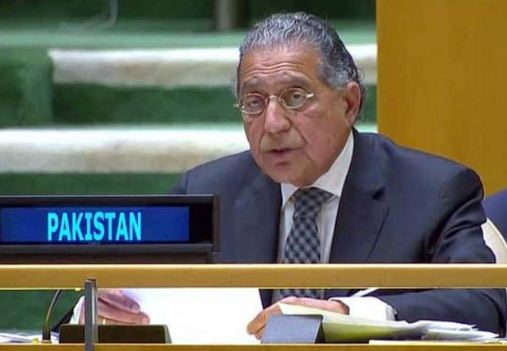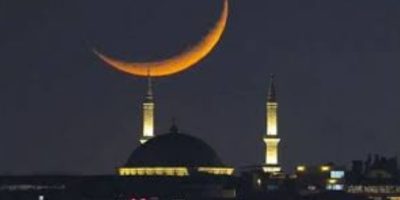Pakistan urges ‘concrete’ UN steps to end Israeli Gaza slaughter; pushes for 2-state solution

UNITED NATIONS, Jan 24 (APP/DNA) – A senior Pakistani diplomat has called for “concrete steps” by the United Nations to stop the Israeli slaughter of the people in Gaza, as he underscored that a lasting end to the Israeli-Palestinian conflict can only come through a two-state solution.
“It is now time for the Security Council, for the entire membership of the United Nations, to consider measures by which to reverse this wanton rejection of peace,” Ambassador Munir Akram told the 15-member body on Tuesday, referring to the repudiation of the two-state formula by Israel.
“We hope the Council will be able, finally, to adopt a resolution demanding a complete cessation of hostilities, full access to humanitarian assistance for the besieged population of Gaza, and international protection for the Palestinian people,” he said in a high-level Council debate on the Middle East crisis.
Tuesday’s meeting featured more than 60 speakers, including many ministers, who discussed the need for a humanitarian ceasefire, the urgency with which to scale up aid, the importance of pursuing a two-State solution and the imperative to avoid further regional escalation.
Deploring Israel’s defiance of world opinion, Ambassador Akram said, “If the Israeli leadership persists in refusing peace, the Security Council, the General Assembly, and indeed all UN Member States, must take steps to hold it accountable.
“There are numerous precedents of measures that can be taken to persuade compliance with decisions of the Security Council and the General Assembly, the Pakistani envoy added, without specifying those steps.
“In order to ensure the inevitability of the two-State solution, it is also time to admit Palestine as a full member of the United Nations,” he stressed. Palestine currently has observer status at the U.N.
“Unfortunately, despite world opinion, despite the advice of its closest allies, and of many of its own people, the extremist Israeli leadership remains adamant in continuing this brutal war and rejecting the prospect of a Palestinian State and the two-State solution,” Ambassador Akram said.
“This will consign the Middle East to perpetual conflict.”
Describing the harrowing situation left behind by relentless Israeli bombardments of Gaza, Ambassador Akram said, “This brutal and indiscriminate killing of innocents, and the suffering imposed on an entire population, amounts to genocide, as asserted in the case filed by South Africa in the ICJ (International Court of Justice, which is based in the Hague).
“Every tenet of international humanitarian law has been violated by the Israeli occupation,” he told delegates from around the world.
“It is sad that, despite the calls by the General Assembly in two resolutions, despite the near-unanimous votes in this Security Council, the international community has failed to stop this genocide taking place in front of our eyes, the Pakistani envoy said, noting that violence and war have spread to adjacent areas of Palestine – to the Israel-Lebanon border, Syria, Iraq and Yemen.
“Unless the Israeli war machine is stopped, there is every likelihood of further escalation in which many nations may be engulfed,” he said.
“A heavy responsibility rests on the Security Council for failing to prevent the continuation of Israel’s war, and its atrocities against the Palestinian people in Gaza, and the accompanying brutalities in the West Bank.”
In conclusion, Ambassador Akram said, “Beyond the eloquent words heard in the Council’s debate today, we look for concrete steps to halt the slaughter of innocents and bring peace to Palestine, to Israel and the Middle East.”
Most countries in the Global South denounced Israel’s deadly war on Gaza and its violence against civilians in the enclave, and called for a humanitarian ceasefire. But diplomats noted that India followed the West’s line, squarely blaming Hamas for the current conflict, while stressing the release of Israeli hostages.
“We are aware that the immediate trigger for the conflict was the terror attacks in Israel on seven October last year. There can be no justification for terrorism and hostage-taking,” Ambassador R. Ravindra, deputy permanent representative of India to the UN, said in his speech.
“There can be no justification for terrorism and hostage taking,” the Indian envoy said. “Our thoughts are with those who have been taken as hostages and we reiterate the demand for their immediate and unconditional release,” he added, making no demand for the thousands of Palestinian civilians abducted and imprisoned by Israel.
Also, India did not call for a humanitarian ceasefire. Instead, the Indian envoy urged all parties to “deescalate” the situation and work towards creating conditions for an early resumption of direct peace negotiations.
Under Prime Minister Narendra Modi’s Hindu nationalist government, India has abandoned its traditional stand on Palestine as New Delhi forged strategic ties with Israel, diplomats pointed out.
“It is critical to prevent further escalation of violence and hostilities,” Ravindra added.
Opening the debate, UN Secretary-General Antonio Guterres called for the two-state solution, following the rejection of such a formula by Israel’s leaders amid the humanitarian crisis in Gaza.
“Any refusal to accept the two-state solution by any party must be firmly rejected,” said United Nations Secretary-General António Guterres in his briefing to the 15-nation organ, stressing that Israeli leaders’ recent, clear and repeated rejection of a two-State solution is unacceptable.
The denial of the right to Statehood would indefinitely prolong the conflict, and a one-state solution — huge Palestinian populations inside that State without any real sense of freedom, rights and dignity — would be inconceivable. The only way to address the legitimate aspirations of both Israelis and Palestinians is through the two-state formula, he underscored.
Riyad Al-Maliki, Minister for Foreign Affairs and Expatriates of the State of Palestine, said that Israeli leaders “do not see our people as an empirical and political reality to coexist with, but as a demographic threat to get rid of through death, displacement or subjugation”.
There are only two paths ahead, he stressed — one that starts with Palestinian freedom and leads to shared peace and security in the region, or one that continues denying this freedom and dooms the region to endless conflict.
“Israel should no longer entertain the illusion that there is somehow a third path whereby it can choose continued occupation and colonialism and apartheid and somehow still achieve regional peace and security,” he emphasized.
Russsian Foreign Minister Sergey Lavrov said that the Council has not mounted an appropriate response to the situation due to the position of the United States.
He went on to call for a world order based not on Anglo-Saxon rules, but on international law with the United Nations playing a central role. Western countries want to focus on the day after the Israeli-Palestinian conflict as if the escalation in Gaza had already ceased, he pointed out, adding that the cunning logic of Western delegations is obvious, as they have blocked all Council efforts to call for an acutely necessary ceasefire.
For her part, Uzra Zeya, US Under Secretary of State for Civilian Security, Democracy and Human Rights, called on Israeli leaders to take feasible precautions to minimize civilian harm in line with international law. She also emphasized Hamas’ role in unleashing the conflict and condemned attacks in the wider region by Iran and its proxies.
Emphasizing that the only guarantor of peace is a two-state solution — with Israel’s security guaranteed — she called for a strong Palestinian Authority in the West Bank and Gaza, even if this was “difficult to imagine”.
Related News
Rana Mashhood Meets Italian Ambassador Armellin
Rana Mashhood, Italy’s Ambassador Armellini Discuss Trade, Education, Legal Labor Mobility and Youth Cooperation toRead More

Ramadan moon sighted in Pakistan, fasting starts today
ISLAMABAD, FEB 19: Pakistan begins the first fast of Ramadan 2026 today (Thursday), following theRead More


Comments are Closed